Ludeon’s RimWorld isn’t just one of the best simulations in recent memory; it makes a strong case for being on track to become one of the best ever made.
I’ve got a bit of a dilemma. My tribe of cannibals has recently lost two of its best hunters in a fight with a nearby rival tribe, leaving me with three people significantly less qualified to defend our primitive hold. We’ve been doing well for ourselves, with beds and electricity and even some limited climate control, allowing us to refrigerate our food in a small nearby cave.
The opposing tribe has fled, and their quarry — a very qualified hunter in his own right — can now be rescued. Problem is, we weren’t actually trying to rescue him. Our refrigerator’s stockpile of human meat is almost depleted, and the weakened fugitive would have really helped us get through the remainder of a grueling winter.
Now we need a fighter as badly as we need the protein.
It’s the latest experiment in a long series of scenarios I’ve played out in RimWorld, a sci-fi/Western colony simulator from Tynan Sylvester and Ludeon. I’ve set up hubs for trading goods that became too rich for their own good, eventually drowned in a flood of antagonists jealous of their relative wealth in a barren wasteland. I’ve seen a married couple adopt an emu, only to see that bird go mad from an infected wound and savage the wife. She lost an arm, but I replaced it with a giant motorized blade.
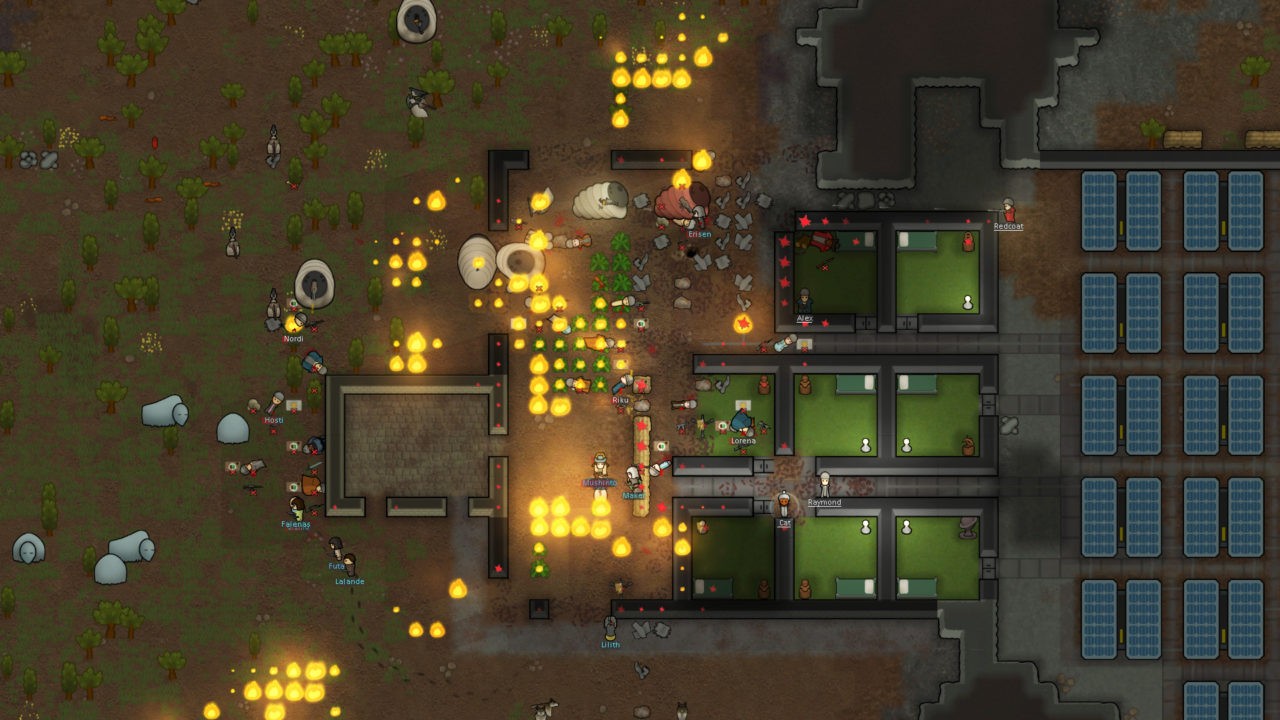
RimWorld is a brutal simulation of space colonization, hovering somewhere between The Martian and Lord of the Flies. Its simplistic graphics are merely a vehicle for some of the most compelling emergent interaction I have ever witnessed in any game. At its best, it rivals even Dwarf Fortress for sheer story creation power. At its worst, it’s still a maddeningly addictive experiment in complex system interaction.
It shouldn’t be hard to guess that I’m going to recommend the game; indeed, it’s secured a spot among my favorite games ever made. Even in its alpha state, it’s already one of the most satisfying experiences I’ve had since the glory days of Will Wright-era Maxis.
On the surface, RimWorld doesn’t appear to be anything particularly stunning. The art style is necessarily simplistic, and though its description seems ambitious, plenty of games have made grandiose claims that in no way represent their actual experience. RimWorld is just the opposite. Beneath a humble exterior is the convergence of dozens of intersecting simulations, most of which are intent on driving your hapless colonists into madness and ruin.
The simplicity of its presentation belies a complexity apparent from the very moment you begin your first game. Once you’ve generated a world map, you can choose your place in the world. There are numerous biomes, ranging from deserts to tundra, dense jungles or frozen waste. Each will have substantial differences in challenge, terrain, and wildlife.
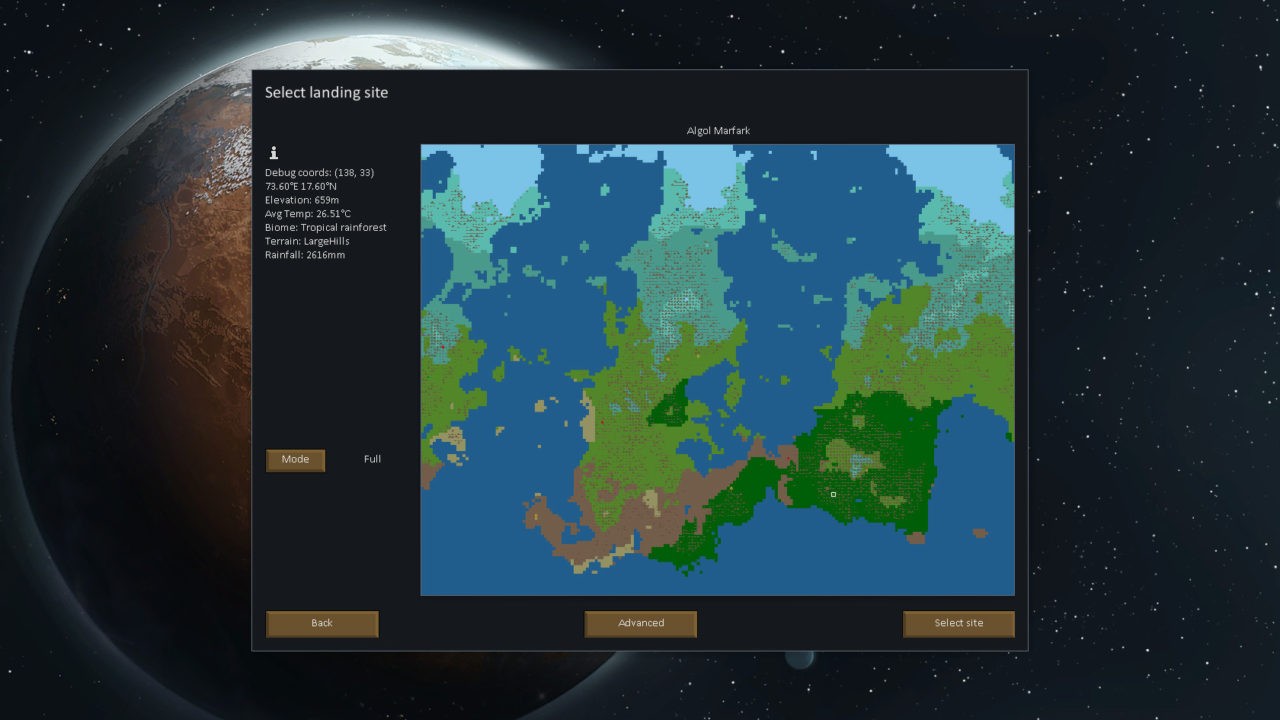
You can choose to embark as a three-person crew of colonists, or five members of a tribe. That choice alone produces wildly varying experiences: the colonists are few but knowledgeable and efficient, while the tribe is forced to try and take advantage of their numbers in order to compensate for primitive tools and ignorance.
AI storytellers will also have a massive impact. Aside from the default slow escalation of threats over time, you can choose an intelligent difficulty that will allow for more elaborate base-building over time, or dive into the true spirit of the game with one that’s completely random and thoroughly unfair.
You can further customize your experience with the scenario editor. It can be as simple as making the game easier or harder with the starting supplies available, or used to create very specific conditions for your adventure. There are no wrong answers, and even the cushiest start is liable to end in catastrophe without intelligent management.
There’s a whole lot to manage, because all of your colonists are randomly generated as well. Even if none of your characters are drug addicts, alcoholics, or psychopaths, there are innumerable combinations of skills and traits that make each team of prospective settlers unique. A disgraced noble might refuse to take part in manual labor, while a pacifist will do little more than cower at the threat of bloodthirsty raiders. Each individual sports a host of opportunities to succeed or fail.
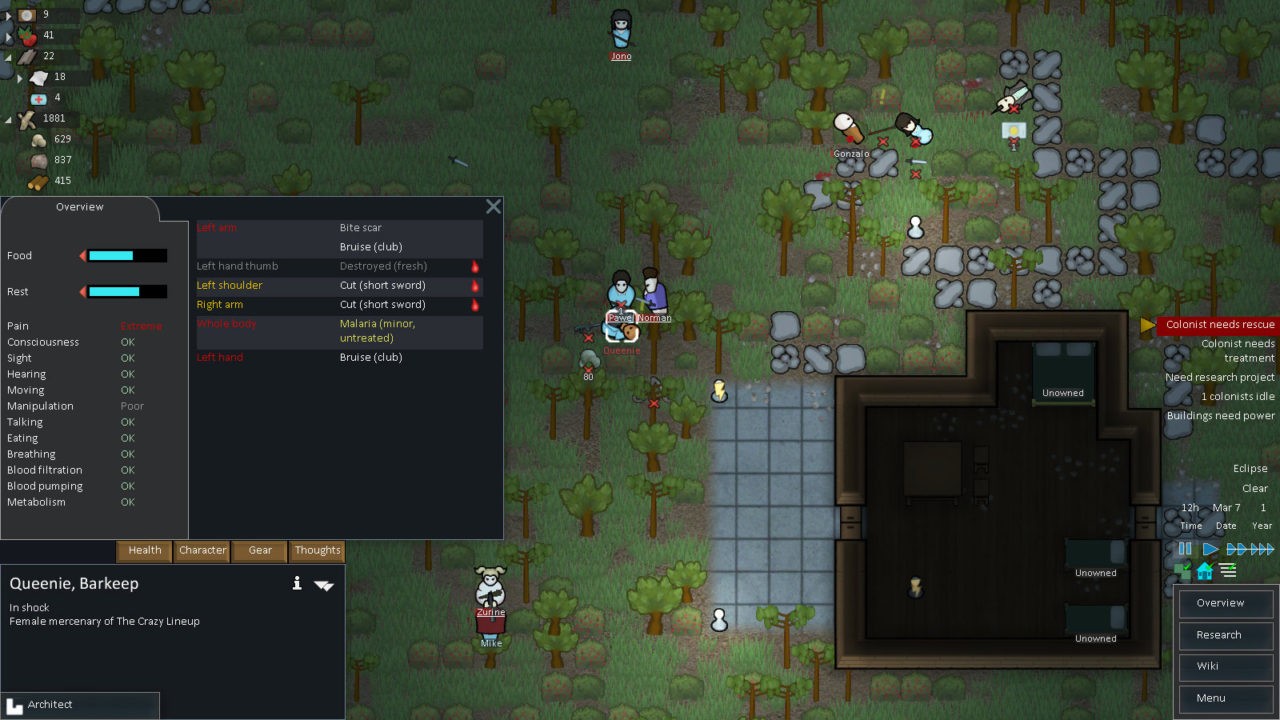
The needs of any group are similar. You’ll want steady supplies of food, whether that means hunting or farming or trading — usually a combination of all three. You’ll want shelter, comfort, and what little entertainment you can muster amidst your inhospitable territory. Most of what you use you’ll need to produce yourself, which will mean creating means of production and training someone for the task.
The user interface allows all of this with a simple elegance that mimics games like Roller Coaster Tycoon, Theme Hospital, or more recently Prison Architect. While a lack of any real tutorial can make your first attempt or two a bit confusing, for the most part everything is clearly described and of obvious utility. Simply focusing on food, shelter, and then energy is enough strategy to make a solid start in virtually any scenario. From there, it becomes a story of your own creativity and responding to ever-changing situations.
Your colonists are only directly under your control if you force it. Most of the time they’ll work at their assigned tasks according to priorities that you can leave automated or tune to your liking via a simple chart. They’ll do their best to fulfill your wishes, so long as they aren’t too tired, hungry, depressed, angry, scared, bored, distracted, senile… If it’s starting to sound like a deranged and violent version of The Sims, you’re not too far off.
Right now, the only “win condition” is advancing far enough to create a ship to escape the wilderness of the planet you’ve landed on. Alternatively, I’ve had more fun just staying put in my colony to see how long before the world finally consumes my survivors in blood and flame. This is the whole of the endgame, once more recalling the virtually inevitable defeat of Dwarf Fortress.
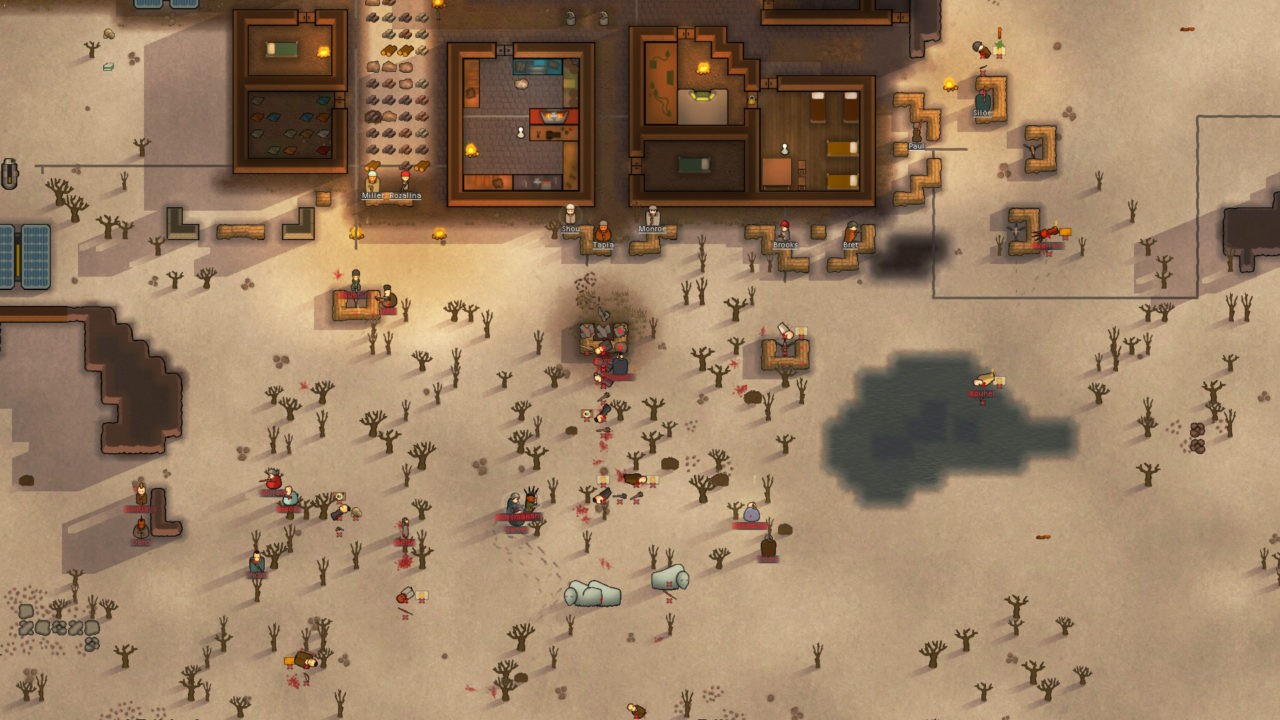
Everything you do helps to create a narrative. Every scenario is brimming with potential drama, stories to tell both fellow players and the uninitiated. Instead of trying to describe the visceral pleasure of a perfectly timed headshot in the final minutes of a deathmatch, you’ll be relating tales of love and loss that sound as if they could have come from a book or movie. Every internal system plays with and against each other.
There’s something truly special about the way that this game creates stories in concert with the player, the way that the graphics are only just present enough to visualize events otherwise defined by a series of minimalist messages and simple numbers. What RimWorld attempts to do, it does so masterfully.
It’s not enough to examine the game as it stands, however. Almost all of this was true from the very beginning, but every update adds substantially to the mix. Every time another alpha build releases, there are a host of new items, new and horrific ways to lose, and wholly new systems to add further complexity to an already dynamic sandbox. The game isn’t done, but it’s already at least as good as anything else that’s even remotely similar.
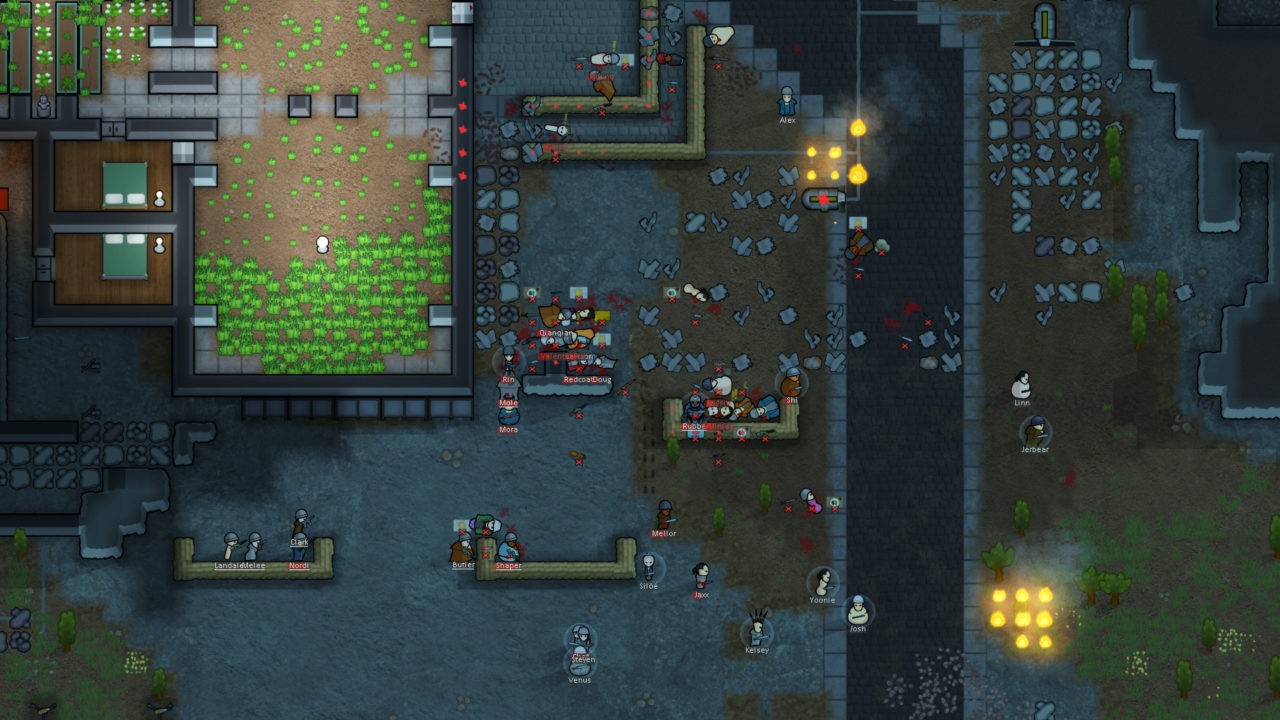
My criticisms are limited. I’d like to see a little more visual variation in colonists for the sake of personality, and perhaps some more positive reinforcement for accomplishing arduous tasks. And while colonists already have many interactions — recently including marriage and divorce — I’d like to see charisma, leadership, and pride deepen their emotional responses.
The end-game still needs work. Right now, “winning” is still essentially losing, as you abandon your hard work to start from scratch. We’re also missing one of the biggest draws of Dwarf Fortress-style stories — the sort of comprehensive event and combat log on which things like Boatmurdered were based.
I could include dozens of ideas for tweaks, but it comes down to a very simple request: I just want even more of what’s there. The game’s history suggests that’s exactly what I’ll get, thoughtfully implemented and tweaked until it’s hard to imagine the game without it.
I’ve put dozens — if not hundreds — of hours into RimWorld, and I can already hear its siren song beckoning me back to my certain doom. If sims are your cup of tea, or if you’ve been looking for just the right one to introduce you to the genre, look no further.
Follow Nate Church @Get2Church on Twitter for the latest news in gaming and technology, and snarky opinions on both.
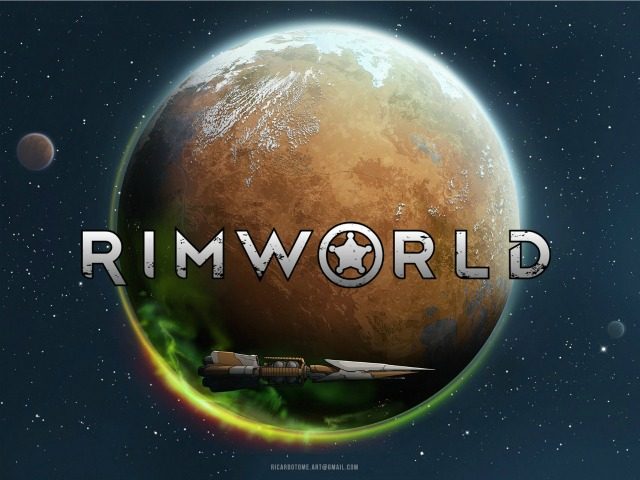
COMMENTS
Please let us know if you're having issues with commenting.